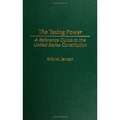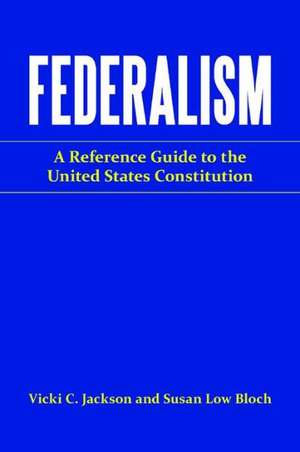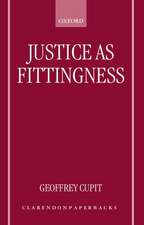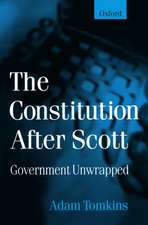Federalism: A Reference Guide to the United States Constitution: Reference Guides to the United States Constitution
Autor Vicki C. Jackson, Susan Low Blochen Limba Engleză Hardback – 8 sep 2013 – vârsta până la 17 ani
Din seria Reference Guides to the United States Constitution
- 19%
 Preț: 458.81 lei
Preț: 458.81 lei - 24%
 Preț: 460.93 lei
Preț: 460.93 lei - 28%
 Preț: 438.07 lei
Preț: 438.07 lei - 27%
 Preț: 438.67 lei
Preț: 438.67 lei - 28%
 Preț: 461.69 lei
Preț: 461.69 lei - 28%
 Preț: 461.18 lei
Preț: 461.18 lei - 28%
 Preț: 436.32 lei
Preț: 436.32 lei - 28%
 Preț: 461.60 lei
Preț: 461.60 lei - 38%
 Preț: 439.85 lei
Preț: 439.85 lei - 27%
 Preț: 345.23 lei
Preț: 345.23 lei - 28%
 Preț: 436.92 lei
Preț: 436.92 lei - 24%
 Preț: 463.88 lei
Preț: 463.88 lei - 24%
 Preț: 458.48 lei
Preț: 458.48 lei - 28%
 Preț: 436.92 lei
Preț: 436.92 lei - 24%
 Preț: 463.38 lei
Preț: 463.38 lei - 28%
 Preț: 438.00 lei
Preț: 438.00 lei - 28%
 Preț: 435.97 lei
Preț: 435.97 lei - 23%
 Preț: 567.65 lei
Preț: 567.65 lei
Preț: 514.74 lei
Preț vechi: 700.54 lei
-27% Nou
Puncte Express: 772
Preț estimativ în valută:
98.52€ • 102.47$ • 82.56£
98.52€ • 102.47$ • 82.56£
Carte tipărită la comandă
Livrare economică 14-28 martie
Preluare comenzi: 021 569.72.76
Specificații
ISBN-13: 9780313318849
ISBN-10: 0313318840
Pagini: 332
Dimensiuni: 156 x 235 x 25 mm
Greutate: 0.74 kg
Ediția:New.
Editura: Bloomsbury Publishing
Colecția Praeger
Seria Reference Guides to the United States Constitution
Locul publicării:New York, United States
ISBN-10: 0313318840
Pagini: 332
Dimensiuni: 156 x 235 x 25 mm
Greutate: 0.74 kg
Ediția:New.
Editura: Bloomsbury Publishing
Colecția Praeger
Seria Reference Guides to the United States Constitution
Locul publicării:New York, United States
Caracteristici
Enables law students and lawyers to improve their understanding of the legal doctrines that underlie today's conflicts.
Notă biografică
Susan Low Bloch, JD, is professor of constitutional law at Georgetown University Law Center, Washington, DC. Bloch is the coauthor of Inside the Supreme Court: The Institution and Its Procedures as well as Supreme Court Politics: The Institution and Its Procedures.Vicki C. Jackson, JD, BA, is Thurgood Marshall Professor of constitutional law at Harvard Law School, Cambridge, MA. Her published works include Constitutional Engagement in a Transnational Era; Federal Courts Stories, with Judith Resnik; and Inside the Supreme Court: The Institution and Its Procedures with Susan Low Bloch.
Cuprins
AcknowledgmentsIntroductionChapter I: The Founding to the Civil WarThe Convention and the ConstitutionFederal Power to Review State Court Decisions and LawsContracts ClauseEleventh AmendmentState Law in Federal Diversity CasesBroad Scope of National Legislative PowersIntergovernmental Tax ImmunityGibbonsIndian Tribes as "Dependent Sovereigns"State Legislative Authority in Light of Federal Power: Exclusivity, Concurrency, Supremacy, and PreemptionFederal Obligations and State Officials: Extradition and ReturnState Court JurisdictionNational Powers, Part II: Dred Scott as "Antiprecedent"Chapter II: The Civil War and Its AftermathThe Court's Approach to the Thirteenth, Fourteenth, and Fifteenth Amendments: Federalism Unchanged? Racism Untamed?State Contracts, Reconstruction Debt, and Eleventh-Amendment Sovereign ImmunityState Court Jurisdiction, Intergovernmental Immunity, and Judicial FederalismBusiness Regulation in a Changing Economy: Due-Process and Commerce-Clause Challenges to State and Federal RegulationFederal Power, Finance, and the National Government's PowersForeign Affairs: The Rising Claims for Federal ExclusivityChapter III: The Early Twentieth CenturyThe Distinctive Role of Amendments in Reshaping American Federalism: Taxing, Spending, and the Senate"Classical" Legal Thought and Federal Power over Economic Matters: Commerce Clause, Due Process, and TaxesChild Labor, Outlaw Products, and Lottery TicketsTaxing and SpendingRate Regulation and Business Affected with a Public InterestRailroad Safety, Employment, and the DraftSpecial Rules for Unions?The Early New Deal Decisions: Commerce, Spending, and TaxingThe Dormant Commerce ClauseOther Constitutional Limitations on the StatesImmunities: Sovereign Immunity and Intergovernmental TaxesJudicial FederalismFederalism and Foreign AffairsChapter IV: The New Deal Court through the Warren CourtNew Deal Jurisprudence and Federal Power UnleashedThe Threat of Court-Packing and the 1937 "Switch in Time"Federal Power ExpandedThe Commerce Clause and Economic RegulationThe Taxing and Spending Power and Cooperative FederalismWar Powers: Threats to Federalism?State Government Powers and the EconomyRegulatory Powers Unleashed: Due Process and Economic RegulationErie and Federal Common Law: State Law Extended?The "Dormant" Commerce ClauseForeign Affairs and the Interplay of Federal and State PowerPreemptionIntergovernmental ImmunitiesState Sovereign ImmunityTax Immunities, Tenth Amendment, and Testamentary DispositionsJudicial and Legislative ImmunitiesProtecting Civil Rights and Liberties: The Changing Role of the Federal GovernmentBrown v. Board of Education and Its AftermathFederal Civil Rights Legislation: Commerce Clause, Fourteenth and Fifteenth Amendment Powers of CongressThe Incorporation Debate and the Criminal Procedure RevolutionReapportionmentState Obligations to Hear Federal Claims and Judicial FederalismJudicially Developed Abstention Doctrines: Equity and Comity from Pullman to DombrowskiHabeas CorpusSupreme Court Review of State Court DecisionsChapter V: The "New" Federalism and Its FutureThe Tenth Amendment: From "Truism" to ConstraintConstraining Congress's Enumerated PowersThe Commerce and Necessary and Proper ClausesThe Spending and Taxing PowersThe Enforcement Clause of the Fourteenth AmendmentProphylactic Power: Congruent and ProportionalSimilar or Different Standards of Review in Affirmative Action Cases?The Eleventh Amendment and Other Doctrines of Intergovernmental Immunity and State EqualityThe Fundamental Meaning of the Eleventh Amendment: Clear Statements and Limits on Congress's PowerWaiver of Immunity; Abrogation under the Fourteenth AmendmentProspective Relief against State OfficersOther Intergovernmental Immunities and State Equality DoctrineStates' Powers and Constitutional Federalism ConstraintsPreemption and the Supremacy Clause, Congress and the President, Foreign and Domestic AffairsConstraints Imposed by the "Dormant" Commerce ClauseDiscriminationBurdens and BalancingMarket Participant Doctrine and Permissible DiscriminationSubsidies and Permissible DiscriminationThe Decisive Role of Public Ownership: Municipal Flow ControlPrivileges and Immunities, the Second Amendment, and FederalismThe Interaction of Federal and State Courts: Judicial FederalismAnti-Injunction Act, Younger Abstention, and "Our Federalism"Supreme Court Review of State Court Judgments: Michigan v. LongHabeas CorpusFederal Common LawOther Aspects of Judicial FederalismConclusionNote on Theories of Federalism and BibliographyTable of CasesIndex
Recenzii
This is the latest in a series titled Reference Guides to the United States Constitution. Dubbed as a reference guide, it is really a comprehensive treatise on the development of federalism as seen through Supreme Court decisions. . . . Summing Up: Highly recommended. Upper-division undergraduates and above.
With its emphasis on decisions regarding the rights and responsibilities of the federal and state governments, this title is an excellent complement to John Vile's historical approach in the Encyclopedia of Constitutional Amendments, Proposed Amendments, and Amending Issues, 1789-2010. . . . Recommended for upper-division political science, pre-law, and law students studying constitutional law and the role the U.S. Supreme Court plays in determining limitations of the federal and state governments.
With its emphasis on decisions regarding the rights and responsibilities of the federal and state governments, this title is an excellent complement to John Vile's historical approach in the Encyclopedia of Constitutional Amendments, Proposed Amendments, and Amending Issues, 1789-2010. . . . Recommended for upper-division political science, pre-law, and law students studying constitutional law and the role the U.S. Supreme Court plays in determining limitations of the federal and state governments.

















